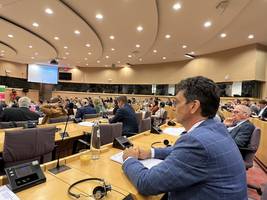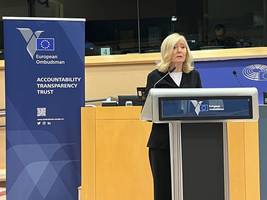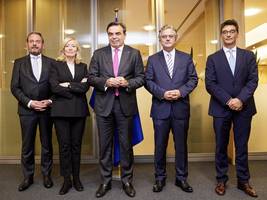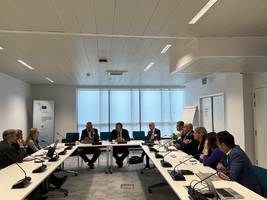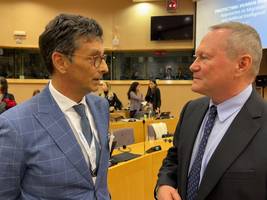Between 9 and 10 Novembre 2023, ombudspersons united in the European Network of Ombudsmen – ENO discussed the current issues in the field of human rights at the European Parliament, with an emphasis on questions of artificial intelligence and ethical standards in the work of public administration but also devoted some time to questions regarding migrations. The conference was organised by the European Human Rights Ombudsman Emily O'Reilly.
In the discussion about artificial intelligence in public administration, the Slovenian Human Rights Ombudsman Peter Svetina pondered on its potential benefits and challenges in ensuring the protection of people’s rights. He advocated the high respect of ethical standards in the operation of the public administration, since this is the only manner of operation that also enables full respect of human rights. “People employed in the public administration must always keep in mind the person for whom they are performing certain services. They must work according to ethical standards that apply in public administration, while human rights must be one of those essential pillars of operation and a beacon enabling them to act in favour of people,” emphasised Ombudsman Svetina.
Regarding migrations, he highlighted the importance of joint action of the European Union member states. “Today there are no fewer crisis centres than a year ago. Ever more frequently they are joined by environmental disasters, due to which people are forced to leave their homes and search for new hope. It is not possible to build a dam strong enough to stop the flow of migrations nor can it be halted with the erection of wire fences; rather, an appropriate European migration policy must be formed,” the Ombudsman stated unambiguously.
Prior to the official start of the conference, on 8 November, the Slovenian Human Rights Ombudsman Peter Svetina together with the European Human Rights Ombudsman Emily O'Reilly and his fellow ombudsmen from Greece Dr Andreas Pottakis and from the Netherlands Rainer van Zutphen responded to the invitation of the European Commission Vice-President Margaritis Schinas for a working dinner in Berlaymont. They focused on the questions of migrations and fundamental human rights and also discussed challenges important for the European Union. Ombudsman Svetina assessed this dinner invitation as an enormous acknowledgement of the work and efforts of the Slovenian institution of the Human Rights Ombudsman both at home and abroad. In the discussion with his fellow ombudsmen and the Vice-President of the European Commission he stressed the significance of open communication and collaboration in addressing challenges connected to migrations. He reminded them of the letter he sent a while ago to the European Commission and emphasised that EU law places on the EU member states certain obligations that cannot be simply unilaterally overlooked or bypassed. “In the EU, we need to strive for synchronised actions of the member states. For we cannot overlook that every single country can be influenced by completely unilateral decisions of other countries, which has happened in the past,” added Ombudsman Svetina, who believes that the issue of migrations should be more appropriately and more actively addressed on the supranational level.
On the margins of the ENO conference, Ombudsman Svetina also participated at the meeting of the board of directors of the European part of the International Ombudsman Institute – IOI, of which he is one of the European directors.

